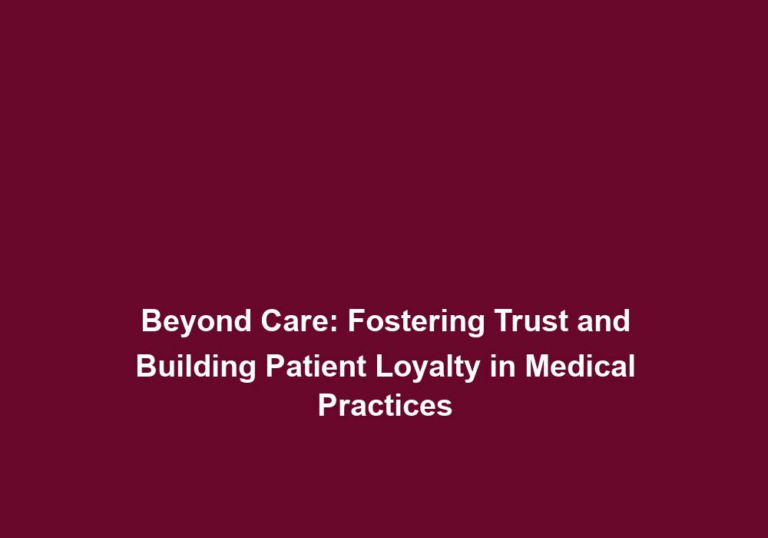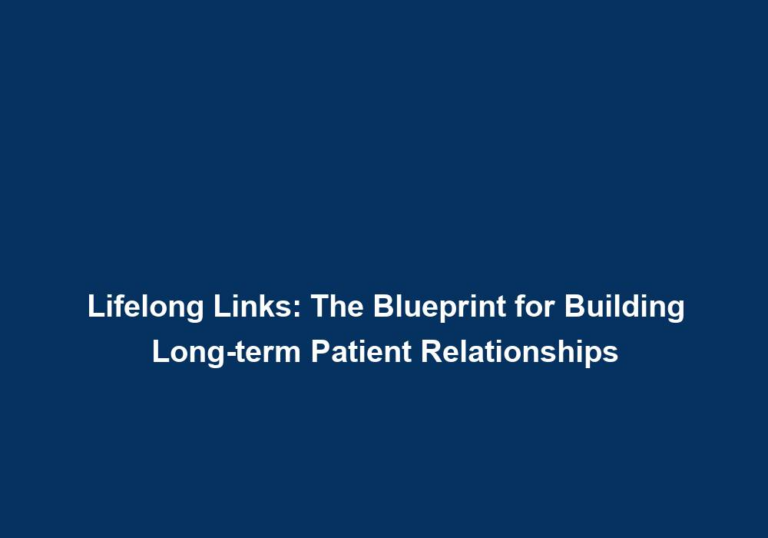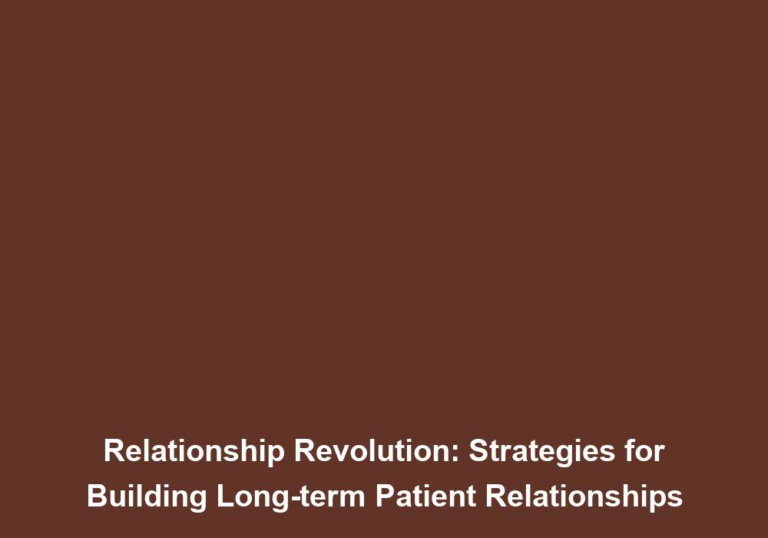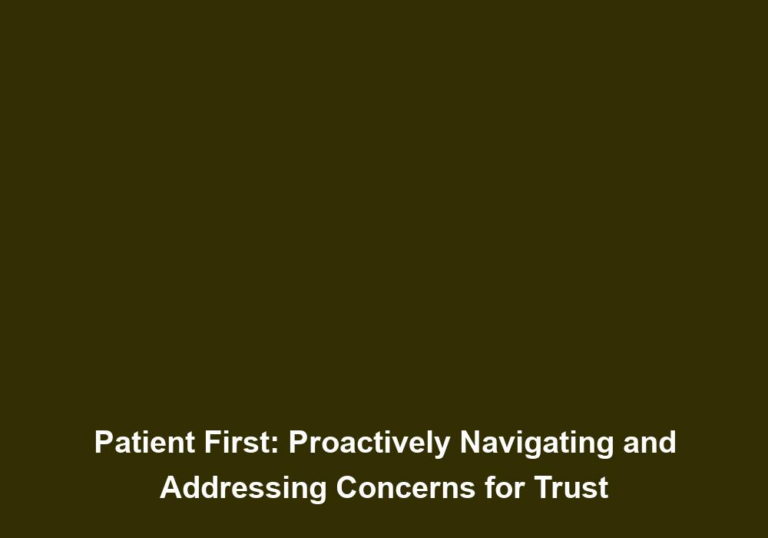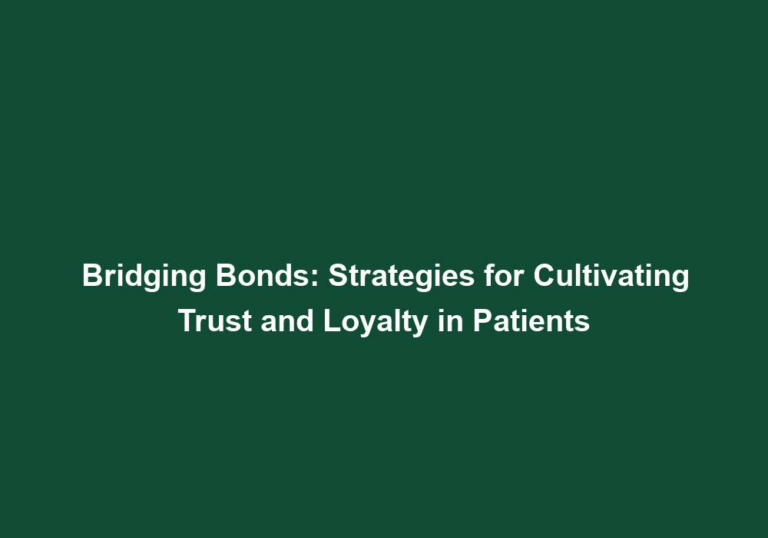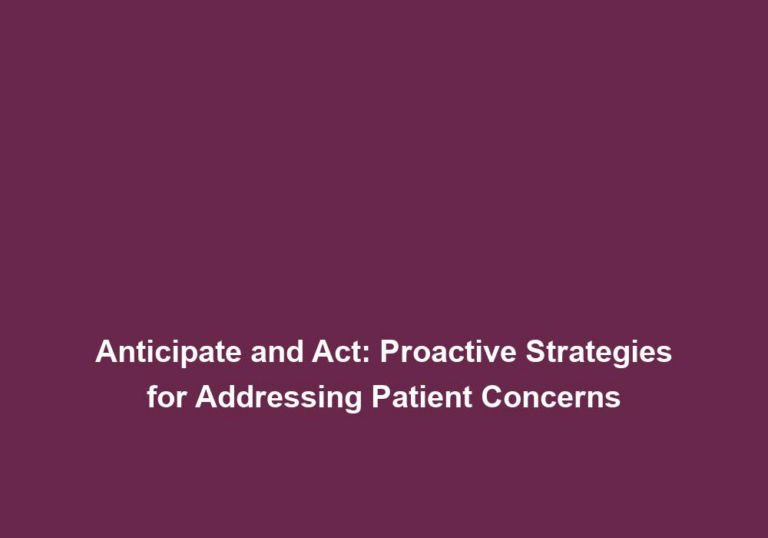Nurturing Ties: Building and Sustaining Patient Relationships for Trust and Loyalty
In the healthcare industry, building and sustaining patient relationships is crucial for trust and loyalty. Effective patient relationship management not only enhances the overall patient experience but also contributes to improved health outcomes. In this article, we will explore various strategies and best practices for nurturing ties with patients, ensuring their trust and loyalty.
Importance of Patient Relationship Management
The importance of patient relationship management cannot be overstated. It has a significant impact on both the patient experience and health outcomes. Let’s delve into the key reasons why it is crucial:
-
Enhanced Patient Experience: When patients feel valued and supported, their overall experience improves significantly. By focusing on patient relationship management, healthcare providers can establish a positive rapport with patients, leading to increased satisfaction and engagement. Effective communication, personalized care, and timely service contribute to an enhanced patient experience.
-
Improved Health Outcomes: A strong patient-provider relationship positively impacts health outcomes. When patients trust their healthcare providers, they are more likely to follow through with treatment plans, adhere to medication regimens, and actively participate in their own care, resulting in better health outcomes. The trust and confidence patients have in their providers play a vital role in their willingness to take necessary actions for their well-being.
-
Patient Loyalty: Building trust and fostering loyalty among patients is essential for long-term success in the healthcare industry. Loyal patients are more likely to recommend the provider to others, leading to increased referrals and a growing patient base. When patients have a positive and trusting relationship with their healthcare providers, they are more likely to stay loyal and continue seeking care from them.
Key Strategies for Building Patient Relationships
To build strong patient relationships, healthcare providers can implement the following strategies:
-
Effective Communication: Clear and compassionate communication is the foundation of a strong patient-provider relationship. Healthcare professionals should actively listen to patients, address their concerns, and explain medical information in a language patients can understand. Regular and proactive communication builds trust and ensures that patients feel heard and valued. It is essential to establish open lines of communication, encourage questions, and provide thorough explanations to foster a strong patient-provider bond.
-
Empathy and Compassion: Demonstrating empathy and compassion towards patients is vital for building trust. Healthcare providers should strive to understand their patients’ emotions, fears, and anxieties, offering support and reassurance throughout the care journey. By acknowledging and validating patients’ feelings, healthcare providers create a safe and comforting environment that fosters trust and loyalty.
-
Personalized Approach: Every patient is unique, and tailoring the care experience to individual needs creates a sense of personalized care. By considering patients’ preferences, cultural backgrounds, and values, healthcare providers can foster trust and loyalty. Taking the time to understand each patient’s specific needs and providing tailored recommendations and treatment plans shows a commitment to their well-being, further strengthening the patient-provider relationship.
-
Timely and Efficient Service: Patients appreciate timely and efficient service. Minimizing wait times, streamlining administrative processes, and providing convenient scheduling options contribute to an overall positive patient experience. Healthcare providers should prioritize efficient appointment scheduling, minimize delays, and ensure that administrative tasks are handled promptly. This demonstrates respect for the patient’s time and reinforces their trust in the provider’s commitment to their care.
-
Transparency and Honesty: Open and honest communication is essential in patient relationship management. Healthcare providers should be transparent about diagnoses, treatment options, and potential risks, enabling patients to make informed decisions about their healthcare. Patients value honesty and transparency from their providers, as it allows them to actively participate in their care and feel empowered in the decision-making process.
Best Practices for Sustaining Patient Relationships
To sustain strong patient relationships over the long term, healthcare providers should follow these best practices:
-
Continuity of Care: Consistency in providing care ensures the sustainability of patient relationships. Encouraging patients to see the same healthcare provider whenever possible promotes familiarity and strengthens the bond between the patient and the provider. Continuity of care allows for a deeper understanding of the patient’s medical history, preferences, and specific needs, enabling more effective and personalized care.
-
Regular Follow-Ups: Following up with patients after appointments or procedures demonstrates ongoing care and concern. Sending personalized messages, making phone calls, or utilizing email communication can help maintain patient engagement and reinforce the relationship. Regular follow-ups show patients that their healthcare provider is invested in their well-being and ensures that any concerns or questions are addressed promptly.
-
Patient Education: Educating patients about their conditions, treatment plans, and self-care strategies empowers them to take an active role in their health. Providing educational materials, conducting workshops, or recommending reputable online resources can enhance patient knowledge and improve their overall experience. Well-informed patients are more likely to actively participate in their care, leading to better health outcomes and a stronger patient-provider relationship.
-
Collecting Patient Feedback: Actively seeking patient feedback allows healthcare providers to understand areas of improvement and make necessary changes. Implementing patient satisfaction surveys, conducting focus groups, or encouraging open communication channels ensures that patient voices are heard and valued. By actively listening to patient feedback and making adjustments accordingly, healthcare providers can continuously improve the patient experience and strengthen patient relationships.
-
Utilizing Technology: Embracing technology solutions can streamline patient relationship management. Electronic health records, patient portals, and telemedicine platforms enable secure communication, easy access to medical information, and convenient virtual appointments, enhancing patient convenience and engagement. Leveraging technology not only increases efficiency but also demonstrates a commitment to providing accessible and patient-centered care.
In conclusion, nurturing ties and building strong patient relationships is indispensable for establishing trust and loyalty within the healthcare industry. Effective patient relationship management involves strategies like effective communication, empathy, personalization, transparency, and timely service. Sustaining these relationships requires continuity of care, regular follow-ups, patient education, feedback collection, and the utilization of technology. By prioritizing patient relationships, healthcare providers can create a positive and supportive environment, leading to improved patient experiences and better health outcomes.


